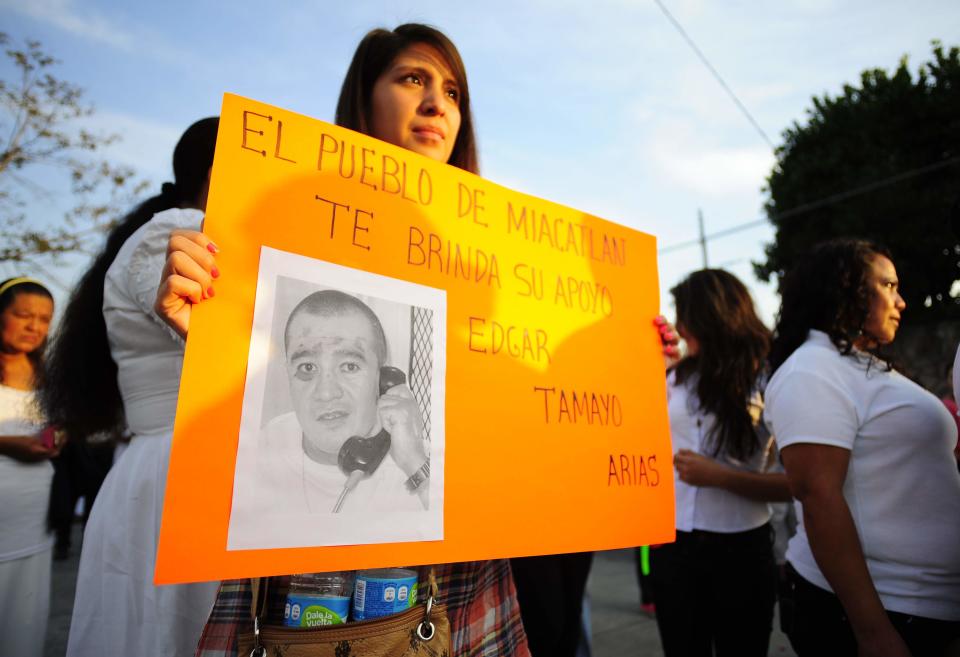Court won't stop execution of Mexican national
HUNTSVILLE, Texas (AP) — A Mexican national moved a step closer to lethal injection Wednesday when a federal appeals court rejected a claim that he was mentally impaired and ineligible to be put to death for the fatal shooting of a Houston police officer 20 years ago.
Texas officials opposed appeals to stop the scheduled lethal injection of Edgar Tamayo, 46, for killing Officer Guy Gaddis, 24, despite pleas and diplomatic pressure from the Mexican government and the U.S. State Department.
Tamayo's lawyers went to the U.S. Supreme Court after the 5th U.S. Circuit Court of Appeals said an appeal this week renewing an earlier contention that Tamayo was mentally impaired and ineligible for execution was filed too late.
Tamayo's attorneys argued the Inter-American Commission on Human Rights, an arm of the Organization of American States, had determined only last week that Tamayo was mentally impaired. Lawyers contended Tamayo should be granted an exception to court rules barring such new last-minute appeals.
His attorneys also appealed a federal judge's refusal to stop the Texas Board of Pardons and Paroles from a clemency recommendation in Tamayo's case because of what they argued were unfair procedures by the panel. The board, appointed by Gov. Rick Perry, can recommend he grant clemency. As it has in nearly all previous death penalty cases, the panel rejected Tamayo's request for clemency.
"It doesn't matter where you're from," Perry spokeswoman Lucy Nashed said. "If you commit a despicable crime like this in Texas, you are subject to our state laws, including a fair trial by jury and the ultimate penalty."
Gaddis, who had been on the force for two years, was driving Tamayo and another man from a robbery scene when evidence showed the officer was shot three times in the head and neck with a pistol Tamayo had concealed in his pants. The car crashed, and Tamayo fled on foot but was captured a few blocks away, still in handcuffs, carrying the robbery victim's watch and wearing the victim's necklace.
Tamayo's attorneys and the Mexican government contend Tamayo's case was tainted because he wasn't advised under an international agreement that he could get legal help from his home nation after his arrest. Records show the consulate became involved or aware of the case just as his trial was to begin.
Secretary of State John Kerry previously asked Texas Attorney General Greg Abbott to delay Tamayo's punishment, saying it "could impact the way American citizens are treated in other countries." The State Department repeated that stance Tuesday.
But Abbott's office and the Harris County district attorney opposed postponing what would be the first execution this year in the nation's most active capital punishment state, where 16 people were put to death in 2013.
At least two other inmates in circumstances similar to Tamayo's were executed in Texas in recent years.
The Mexican government said in a statement this week it "strongly opposed" the execution and said failure to review Tamayo's case and reconsider his sentence would be "a clear violation by the United States of its international obligations."
Mexican officials and Tamayo's attorneys contend he was protected under a provision of the 1963 Vienna Convention on Consular Relations. Legal assistance guaranteed under that treaty could have uncovered evidence to contest the capital murder charge or provide evidence to keep Tamayo off death row, they said.
"We obviously take our international obligations very seriously to provide consular notification and access. And we will continue to work to uphold these obligations," State Department spokeswoman Marie Harf said at a Wednesday media briefing in Washington, D.C.
"Mr. Tamayo was convicted of killing a police officer. It's not that we don't take that seriously — it's that we take seriously our obligations to uphold consular access for folks incarcerated here because we go all over the world and ask other countries to do the same thing and apply those same obligations when our folks are incarcerated overseas," she also said.
Tamayo was in the U.S. illegally and had a criminal record in California, where he had served time for robbery and was paroled, according to prison records.
"Not one person is claiming the suspect didn't kill Guy Gaddis," Ray Hunt, president of the Houston Police Officers' Union, said. "He had the same rights as you and I would have.
"This has been looked at, heard, examined and it's time for the verdict of the jury to be carried out."
Tamayo was among more than four dozen Mexican nationals awaiting execution in the U.S. when the International Court of Justice in The Hague, Netherlands, ruled in 2004 they hadn't been advised properly of their consular rights. The Supreme Court subsequently said hearings urged by the international court in those inmates' cases could be mandated only if Congress implemented legislation to do so.
"Unfortunately, this legislation has not been adopted," the Mexican foreign ministry acknowledged.


